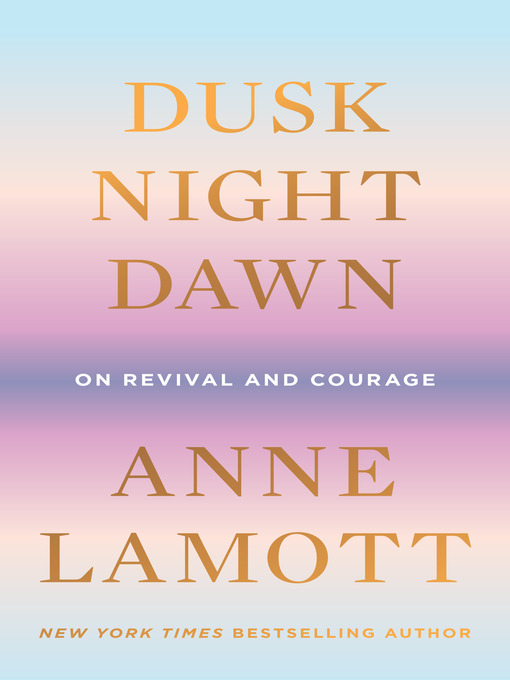
Dusk, Night, Dawn
On Revival and Courage
- اطلاعات
- نقد و بررسی
- دیدگاه کاربران
نقد و بررسی

November 15, 2020
Another helping of pop philosophy from the prolific writer. "Here we are, older, scared, numb on some days, enraged on others, with even less trust than we had a year ago," Lamott writes of such challenges as the pandemic and threats to American democracy and to the planet in general. "Where on earth do we start to get our world and joy and hope and our faith in life itself back?" In these short essays, similar in style and tone as Almost Everything, Hallelujah Anyway, Small Victories, and the author's other works of nonfiction, she ventures some answers. Mixed in with details of her personal life, including her first marriage (at age 65) to a man who, unlike her, is not a Christian; her struggles with alcoholism; and the Sunday school classes she teaches near her California home, the book addresses such topics as forgiveness, repentance, climate change, and more. Though the book will appeal to her longtime fans, the essays are marred by observations that are trite or just plain obvious. For example: "Maturity is retaining a modicum of grace when you do not get your own way"; "Growing up is hard"; "You make the plan but you don't plan the result." Other statements will be open to debate--e.g., "Darkness can be so soothing when you know it won't last forever"; "Love is being with a person wherever they are, however they are acting." It says something about this book that its best line is a misquote of Kurt Vonnegut, who, in a 1994 Syracuse University commencement speech, said he told his grandchildren (Lamott says it was his children) when they complained about the state of the planet, "Don't look at me, I just got here myself." For Lamott devotees, file alongside the aforementioned books; others can take a pass. A simplistic attempt at hope in troubled times.
COPYRIGHT(2020) Kirkus Reviews, ALL RIGHTS RESERVED.

December 1, 2020
In the "third third" of her life, best-selling author Lamott recognizes that she can be judgmental and worried. After all, the environment is damaged, the globe is warming, Covid-19 is rampant, and there's a lunatic in the White House. Still, she manages to face life with her characteristic offbeat faith and hilarious insights. With a new husband enhancing and complicating her life, Lamott seeks a way for all of us to recover our faith, hope, and optimism. We're all flawed, says Lamott, but no one is more honest or funnier about their shortcomings than she is. Whether she's waiting for a flight that's been delayed for 14 hours or searching for a missing kitten or recalling an embarrassing pre-sobriety outing or teaching Sunday school, Lamott is painfully precise in her confessions. Also notable is how her strong faith seems to break through during even the darkest moments, bringing light and hope. Growing older is not for the weak, and every aging person faces loss of mobility, hearing, and focus. But Lamott reminds us that "we have seen life self-correct again and again." We all need to march together and share our stories, Lamott observes, because in the end truth, science, and love almost always win. A message of reason and hope we all need to hear.
COPYRIGHT(2020) Booklist, ALL RIGHTS RESERVED.

February 1, 2021
By turns wise, funny, tragic, mystical, visionary, and imaginative, Lamott's latest book after Almost Everything: Notes on Hope will appeal to a wide range of readers who have previously enjoyed her relatable writing. Readers new to Lamott are opening themselves to a real treat, as her abilities as a storyteller are in full form in this latest book. Beginning with her first marriage at age 65, Lamott, proceeds to detail her life with a characteristic humor based in profound spirituality, offering insight into relationships with her husband, father, and spiritual advisers. Though she is a born-again Christian, she also shares how friendships with Buddhists and Jesuits have influenced her life and teachings. Amusing anecdotes are offered throughout. Her Sunday school students bring her great joy and frustrations. She riffs on the Grimm fairy tale of Six Swans, noting how she relates to the youngest brother with one arm and one wing: "weird, beautiful, hobbled, beloved." Although each chapter stands on its own and can be read separately, the full impact of the book comes toward the end when Lamott writes about the events that led to her recovery from alcoholism. VERDICT Another standout from Lamott that will have wide appeal.--David Azzolina, Univ. of Pennsylvania Libs., Philadelphia
Copyright 2021 Library Journal, LLC Used with permission.




دیدگاه کاربران